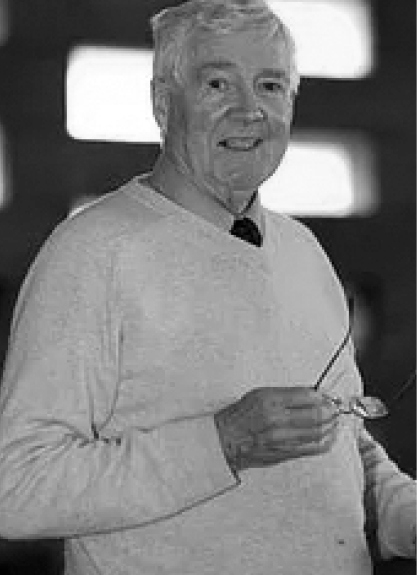The Revd Geoffrey Whitfield MBE: 1933-2017
Baptist minister and psychotherapist who brought Palestinian and Israeli youngsters together through football
 When at the end of 2019 I moved from London to Lewes in East Sussex, I was looking forward to re-connecting with Geoff Whitfield who I knew lived here with his wife Jean. So I was saddened to learn that in fact he had died in 2017, within weeks of the death of Jean (whom I knew only slightly).
When at the end of 2019 I moved from London to Lewes in East Sussex, I was looking forward to re-connecting with Geoff Whitfield who I knew lived here with his wife Jean. So I was saddened to learn that in fact he had died in 2017, within weeks of the death of Jean (whom I knew only slightly).
Geoff was one of those people who make a lasting impression on those whom they meet. I first met Geoff through what was then the Clinical Theology Association (CTA), which was founded by Frank Lake in the early 1960s, initially to provide some kind of training in pastoral care for Anglican ministers. I believe nothing like that had previously been offered – times have changed! As I understand it, Geoff was not by then minister of a local church, probably at least in part because he had a broken marriage behind him (not a good move for a minister, particularly a Baptist, at the time).
Living in Brighton, he was or had been a chaplain at the University of Sussex and also served as interim moderator to at least one local church. But his main occupation by then was as a psychotherapist in the psychodynamic tradition. He ran courses in Group Dynamics and in counselling, for the CTA and independently. A friend and I used to drive down from Leatherhead to Brighton once a week to attend such a course. One week, during the journey home, I remarked that I was amazed at Geoff’s patience with one particular participant. My friend’s response was that perhaps he was holier than we were. Since Geoff was very much a full-blooded earthy human being and a self-avowed megalomaniac, he did not fit with my preconceptions of holiness!
On reflection, however, I realised that she was right – he was a person of integrity who owned and embraced all of himself – and if that is not holiness, I wonder what is. Around that time Geoff was approached by someone from the Baptist Union – it had been noted that he had not practised as minister of a local church for some time and they planned to remove him from the accredited list. Perhaps they thought that like any good Baptist leader, he would simply ‘go quietly’ when told he had become persona non grata (in his case this may have been because he had remarried while his first wife was still alive, or simply that he didn’t fit comfortably in Baptist circles). But true to type as a maverick, he resisted and the matter was dropped.
Also around that time he offered his skills in, and understanding of, Group Dynamics to Spurgeon’s College Council who were experiencing serious problems. His analysis (which I read at the time) was uncomfortably accurate and could have proved extremely helpful but so far as I know, his offer was not taken up.
 At some point later, Geoff became involved in setting up soccer courses and matches for Palestinian and Israeli youngsters together. This became part of (or developed into – I am not sure which) the World Sports Peace Project. It was for his work with this organisation that he received an MBE in 2004. He was author of two books: Amity in the Middle East, about the World Sports Peace Project, in 2006 and The Prenatal Psychology of Frank Lake and the Origins of Sin and Human Dysfunction in 2007. I presume the latter to have been based on work he did for a Master’s degree in the 2000s.
At some point later, Geoff became involved in setting up soccer courses and matches for Palestinian and Israeli youngsters together. This became part of (or developed into – I am not sure which) the World Sports Peace Project. It was for his work with this organisation that he received an MBE in 2004. He was author of two books: Amity in the Middle East, about the World Sports Peace Project, in 2006 and The Prenatal Psychology of Frank Lake and the Origins of Sin and Human Dysfunction in 2007. I presume the latter to have been based on work he did for a Master’s degree in the 2000s.
He and Jean ‘retired’ to Lewes some years ago, where he became involved with Christ Church – the local URC. There he was apparently instrumental in the revival of a group which now meets once a month to consider a contemporary issue, currently known as the Christ Church Think Tank – open to everyone, of all faiths and none. That is no surprise, he was always in touch with what was going on, welcoming to ‘all comers’, and applied his own very lively mind to whatever came his way. According to the King James Version, Jesus said he had come ‘that they might have life and that they might have it more abundantly’.
I haven’t mentioned Geoff’s faith directly, it didn’t seem necessary. Perhaps that is because he fulfilled the purpose expressed in this quotation more fully than many Christians. He knew himself well, he knew he was forgiven and he showed an unusual capacity to live his life in the light of that truth. Every person who dies leaves a gap in the world; the gap left by Geoff feels very large.
Pat Price-Tomes
Images
Geoffrey Whitfield | Next Century Foundation
Geoffrey looks on as a team in the World Sports Peace Project lifts a trophy, as featured in The Baptist Times on 13 August 2010 | Jenswenzel Photography